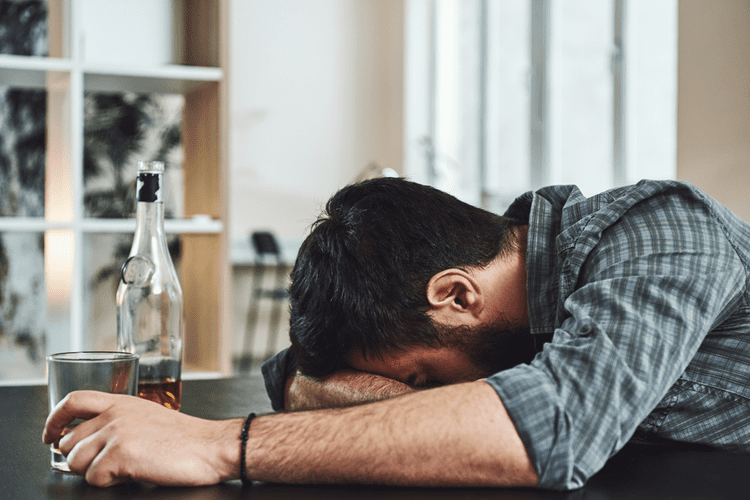Content
Certain ethnic groups have a genetically reduced ability to break down acetaldehyde, the main byproduct of alcohol, as it is first processed in the liver. This results in more reddening of the skin (““Asian flush”) and hangovers how long does a hangover last at lower amounts of alcohol. Most people are well aware of the presence of headache, malaise, diarrhea, loss of appetite, tiredness, nausea and sensitivity to light, sound and motion the day after binge drinking.
- Rapid heartbeat, uncontrollable tremors, and excessive sweating are all signs of acute alcohol withdrawal, along with high blood pressure, irritability, and anxiety or agitation.
- In general, dark liquors have a higher concentration while clear liquors have a lower concentration.
- In most people, the body breaks down acetaldehyde before it causes problems.
- But keep in mind that aspirin and ibuprofen can irritate your stomach, and acetaminophen can damage your already taxed liver if you drank a lot.
- Your body is withdrawing from high levels of circulating alcohol, while at the same time trying to protect itself from the effects of alcohol.
Your head is pounding, your mouth feels like cotton, and the nausea is crippling. The light streaming through the window and the buzzing of your alarm clock make your headache even worse.
Symptoms Of A Bad Hangover
When your liver processes alcohol, it releases the chemical acetaldehyde. This toxic by-product of alcohol contributes to increased inflammation in the brain, gastrointestinal tract, liver, pancreas, and other areas of the body. After a night of drinking, you may feel ready to jump into bed and will likely fall asleep quickly. Unfortunately, that doesn’t mean you will get the rest you need.

Alcohol scrambles the hormones that regulate our biological clocks, which may be why a hangover can feel likejet lag, and vice versa. Alcohol can also triggermigraines, so some people may think they’re hung over when it’s really an alcohol-induced migraine they’re suffering. Intensive Outpatient Programs are more flexible, offering meeting times either in the day or night, making them perfect for people who must work or have other scheduled commitments. Like with day treatment, intensive outpatient programs start with frequent meetings. The greatest danger with alcohol poisoning is losing the gag reflex; a person is at an elevated risk of choking on or aspirating vomit. That’s why knowing how to recover from alcohol poisoning can be a matter of life and death.
You Drank On An Empty Stomach
But it can cause inflammation in organs, leading to uncomfortable symptoms. Treatment for AUD at Heroes’ Mile begins with medical alcohol detox. During this detox, our veteran staff can help you safely deal with alcohol withdrawals while under 24/7 care.
While this drug is not available in the U.S., other related medications, including ibuprofen, naproxen, and prescription nonsteroidal anti-inflammatory drugs may be similarly helpful. However, when combined with alcohol they might increase the risk of stomach bleeding.
You hide under the covers wanting to sleep, but you can’t. For example, Kudzu root , a popular choice for hangover remedies, has primarily been investigated for its effects in reducing alcohol-mediated stress and hangover. But at the same time, Kudzu root appears to inhibit the enzymes that break down acetaldehyde – not good news since you want to clear that acetaldehyde from your system quickly. So if you find yourself with a two day hangover reach out to us and we will have you feeling back to your old self in no time flat. Another factor of alcohol consumption that can contribute to a hangover is the fact that alcohol in itself can disrupt the stomach’s natural environment. In simple terms, a hangover is the body’s response to drinking too much alcohol. But I drank heavily just enough – once a month, sometimes more, not often less – to give myself, in the end, crushing, deep, dark anxiety.
Hangover
Using over-the-counter pain medication can help, but they come with a word of caution. Both alcohol and acetaminophen filter through your liver, meaning you shouldn’t use these two products together regularly, or you risk causing damage to your liver. Ibuprofen and alcohol both have gastrointestinal side effects, including bleeding and ulcers. Any time you’re taking two things with the same side effect, you increase your risk. Beverages with fewer congeners are slightly less likely to cause hangovers than beverages with more congeners, but remember that all types of alcohol can result in a hangover.
The compound is commonly added to wine as a preservative. People with sulfite sensitivities may experience a headache after drinking wine. You’ve probably heard it’s a good idea to eat after drinking, so food can soak up the alcohol. Having a stomach full of food at the end of the night will probably only cause you more problems.
Health Solutions
Getting out of the house may not be a bad idea as long as you’re up for it. Also, remember that you may still be drunk, so seriously check yourself before driving.
Having a hangover can make you feel utterly miserable and can even cause mood swings. Aside from dehydration, alcohol also has toxic effects on the body that can worsen hangover symptoms. It is also believed that drinking darker colored alcohol like bourbon, brandy, and wine will more likely lead to a hangover compared to clear alcohol like gin or vodka. Additionally, mixing types of alcoholic drinks and drinking on an empty stomach also heighten the likelihood of a hangover. A hangover is a collection of unpleasant physical and mental symptoms that occur after a session of heavy alcohol consumption. The severity of hangover symptoms can depend on many factors, such as how much alcohol was consumed and the type of alcohol. But hangovers are caused by only one thing—drinking too much alcohol.
Person
Long, lost, miserable days in bed, curtains closed against the sunshine, trying to piece together the night before. It had been saying similarly annoying things for years. But, Drug rehabilitation like all the other times, I had poured myself a drink and ignored it. Drinking interferes with brain activity during sleep, so a hangover may be a form ofsleep deprivation.
Age- There is evidence to support the fact that as you age your body becomes less capable of breaking down and processing alcohol. When you are drinking you are also urinating more, causing your body to get rid of other forms of hydration within your system. Dehydrationis a major factor for the sick feelings that accompany a hangover. While these may sound extreme, they are certainly not to be taken lightly and we would be remiss if we failed to include the serious symptoms when discussing what a hangover could possibly entail. It can present itself with a variety of symptoms and differs from person to person, depending on different factors. Drinking in moderation is not the answer to life, the universe and everything, of course. I still feel like crap when I wake up – the cruel trick of ageing.
I thought this was a tweet for how long my hangover will last.
— RustyVR 🇬🇧 (@rusty_vr) November 26, 2021
As widespread as hangovers are, scientists aren’t precisely sure what causes them. Their best guess is that multiple factors — including dehydration, inflammation and byproducts of the way the body processes alcohol — contribute to the unpleasant experience of being hungover. Nearly anyone who’s ever had a night of moderate to heavy drinking knows firsthand the misery of a hangover. In fact, hangovers are so common that 35 to 50 percent of adults who drink alcohol experience one at least once a year. Of course, limiting alcohol intake and substituting water for many of those drinks during an evening out is probably the best method to avoid a painful hangover.
On the other hand, there is some evidence that mixing drinks with different levels of cogeners can lead to particularly brutal hangovers. Additionally, carbonation is known to increase the blood’s absorption of alcohol. Drinking carbonated beverages before or with hard liquor may cause more rapid absorption, getting you drunk faster. Ethanol has a dehydrating effect by causing increased urine production , which could cause thirst, dry mouth, dizziness and may lead to an electrolyte imbalance. Studies suggest that electrolyte changes play only a minor role in the genesis of the alcohol hangover and are caused by dehydration effects. Drinking water may help relieve symptoms as a result of dehydration but it is unlikely that rehydration significantly reduces the presence and severity of alcohol hangover. Alcohol’s effect on the stomach lining can account for nausea because alcohol stimulates the production of hydrochloric acid in the stomach.

Having no food in your stomach speeds the body’s absorption of alcohol. Alcohol causes your blood vessels to expand, which can lead to headaches. In turn, urinating more than usual can lead to dehydration — often indicated by thirst, dizziness and lightheadedness. It’s no secret that countless Americans love White Claw. White Claw is a hard seltzer that is marketed to young adults but the drink has become increasingly popular for people of all ages.
But on average, a hangover should end about 12 hours after stopping drinking. What happens to your body after you take your first sip of alcohol? Learn the effects of drinking on your body and mental well-being.
my girlfriend and I were trying to work out how you would eat so much cheese. If you have a party and invite 24 people, they would still have to eat 500g each by the time the night is over which would induce a cheese hangover. How long would it last once opened, I wonder?
— Jake Worrell (@jake_worrell) April 13, 2021
It’s not surprising that a theory arose suggesting dehydration causes hangovers, but science disagrees. Studies have shown that the level of electrolytes in those with a hangover versus those without are not all that different. And further, in cases where there are variances, no correlation exists between severity of symptoms and level of electrolytes or the level of hormones in the blood. Alcohol poisoning occurs when you ingest too much alcohol on a single occasion. This can happen after exceeding 6 drinks and reaching a blood alcohol level of 0.31% or higher.



